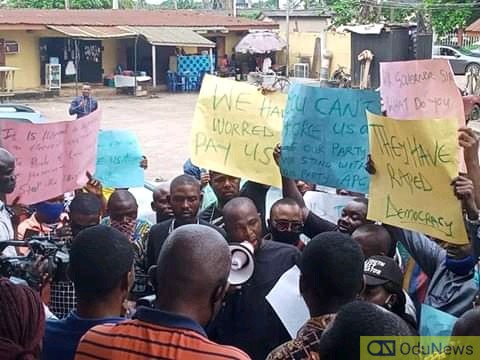As new minimum wage bites hard, most states now depend on federal allocation to pay workers

The amount allocated for salaries and allowances for state workers has skyrocketed, moving from N2.036tn in 2024 to a staggering N3.87tn in the approved 2025 budget. This sharp increase is largely due to the implementation of the new N70,000 minimum wage and a rise in political appointments.
Although state governments earmarked N2.8tn for personnel costs last year, they only paid out N2.036tn, falling short by N764bn according to budget implementation reports. Data from the 2025 approved budgets shows that at least 27 states may not be able to pay workers’ salaries this year without waiting for federal allocations.
President Bola Tinubu approved the new N70,000 minimum wage in July 2024 after tough negotiations with labour unions. However, implementation across states has been slow, with several states yet to fully adopt the new wage structure. This prompted the Nigerian Labour Congress (NLC) to issue a stern ultimatum, demanding compliance by December 1, 2024.
Despite the warning, many states have yet to start paying the new wage, delaying the financial relief workers were hoping for. An analysis of state budgets revealed wide disparities in personnel costs: while 20 states recorded salary hikes above 50 per cent, 16 states had more moderate increases. Some states, like Cross River and Taraba, saw their payrolls more than double.
For example, Abia’s personnel costs jumped 134 per cent from N33.045bn to N77.34bn, while Cross River experienced a staggering 202 per cent rise, from N35.02bn to N106.12bn. Meanwhile, Lagos led in absolute figures with personnel expenses surging from N225.114bn to N401.12bn. On the other hand, Gombe’s personnel cost even dipped slightly by 0.6 per cent.
The surge in salary costs means that only nine states—Lagos, Abia, Benue, Enugu, Ogun, Niger, Kaduna, Kwara, and Osun—can pay salaries without depending on federal allocation. This is a small improvement from 2024 when 24 states could not meet payroll obligations without external support.
Experts have pointed out that this situation reflects both low internal revenue generation (IGR) and the bloated workforce in many states. Muda Yusuf, Director of the Centre for the Promotion of Private Enterprise, explained that some states struggle due to their limited economic activities. “You can’t compare a state like Lagos, where oil companies pay taxes, to a state like Jigawa, where most businesses are small-scale farms,” he said.
He also noted that inefficiency and political patronage worsen the problem. Many states employ more workers than necessary, with reports of ghost workers and underutilized staff. “Some ministries could run with half the current workforce,” Yusuf added.
Professor Segun Ajibola from Babcock University advised state governments to improve IGR without overburdening citizens. He urged them to reduce waste, streamline ministries, and ensure accountability.
A former Zenith Bank chief economist, Marcel Okeke, also criticized political appointments, saying, “Governors appoint hundreds of aides for political reasons. What work do these people actually do?” He argued that cutting down on excessive staffing could help reduce costs.
Similarly, Okechukwu Nwagunma, Executive Director of the Rule of Law and Accountability Advocacy Centre, blamed government officials for lack of sincerity and patriotism. He said, “They claim to reduce costs but end up appointing more ministers and aides. While Nigerians suffer in poverty and hunger, government officials live in luxury.”
With personnel costs now surpassing IGR in most states, the need for fiscal discipline and revenue reforms has never been greater.


Comments are closed.